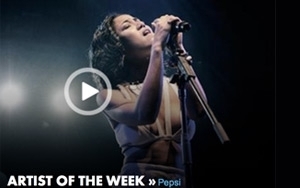 PepsiCo is a beverage company, but it is also a content company. Under the aegis of its cultural marketing division, the Purchase, N.Y.-based beverage giant has been trying a host of
different digital programs focused on delivering a range of Millennial-facing curated content around things like music, art, film, and sports.
PepsiCo is a beverage company, but it is also a content company. Under the aegis of its cultural marketing division, the Purchase, N.Y.-based beverage giant has been trying a host of
different digital programs focused on delivering a range of Millennial-facing curated content around things like music, art, film, and sports.
Grand Central for all of
it is the company’s home page -- now effectively Pepsi Pulse, a content-forward channel for all things Millennial. "It's about marketing innovation,"
said Javier Farfan, head of music, entertainment and cultural marketing at PepsiCo., speaking at MediaPost’s OMMA Premium Display conference. "It's about how to start looking at not just
traditional media buys, but also unconventional ways of engaging that doesn't involve media partners, as we become one ourselves."
advertisement
advertisement
Part of a repositioning of the Pepsi brand around
a "Live for Now" theme, the content focus involves partnerships with the likes of Complex, and content by editorial staff, as well as tie-ins with celebrities like Beyonce and football star
Victor Cruz. "We thought, why not use that access and become the editorial voice in that space? We asked how we could start looking at not just traditional media buys, but also unconventional ways of
engaging that doesn't involve media partners, as we become one ourselves."
He added that programs like Pulse, which evolved from experimentation, function well because Pepsi has
worked for years to make its portfolio of products into lifestyle brands. He said experimentation necessarily involves stepping out on a limb. "I think that risk and innovation is where we need to be.
We have to be okay with that and the organization is getting better at accepting that. We are taking calculated risks, creating tools and partnering with people like [NY-based agency] Sparks &
Honey to make sure we are seeing what is going on out there; so we are taking smaller risks to innovate in bigger ways."
Last year at SXSW, for example, Pepsi hosted a
biometric house-music concert, where attendees wore devices measuring heart rate, temperature and movement. The level of their [measurable] enthusiasm was determined when the DJ appeared, when drinks
were served, etc.
"Now if you do a quick search on the hottest DJ's, we are ranked up there as a credible source. The other piece is that we have become a platform where
people are coming to us — emerging talent who says ‘we want you to show our products.’ It becomes another outside marketing tool," said Farfan. He added that the brand as a
content-delivery company changes its relationship to publisher partners. "The perfect example is our Complex relationship. We are using their site for display ads to drive traffic to us. If you
are a pop-culture [publisher] we serve a pop-culture display ad; if we are on a sports site, we give sports communication driving to Pulse. We need publishers to help us create those ads."
The bottom line, he said, is that brand managers need to be more like brand makers. "We have to get into the concept of being editors and story tellers of brands, and apply a filter of
what's going on culturally. At the end of the day the main metric is making sure the brand is relevant."